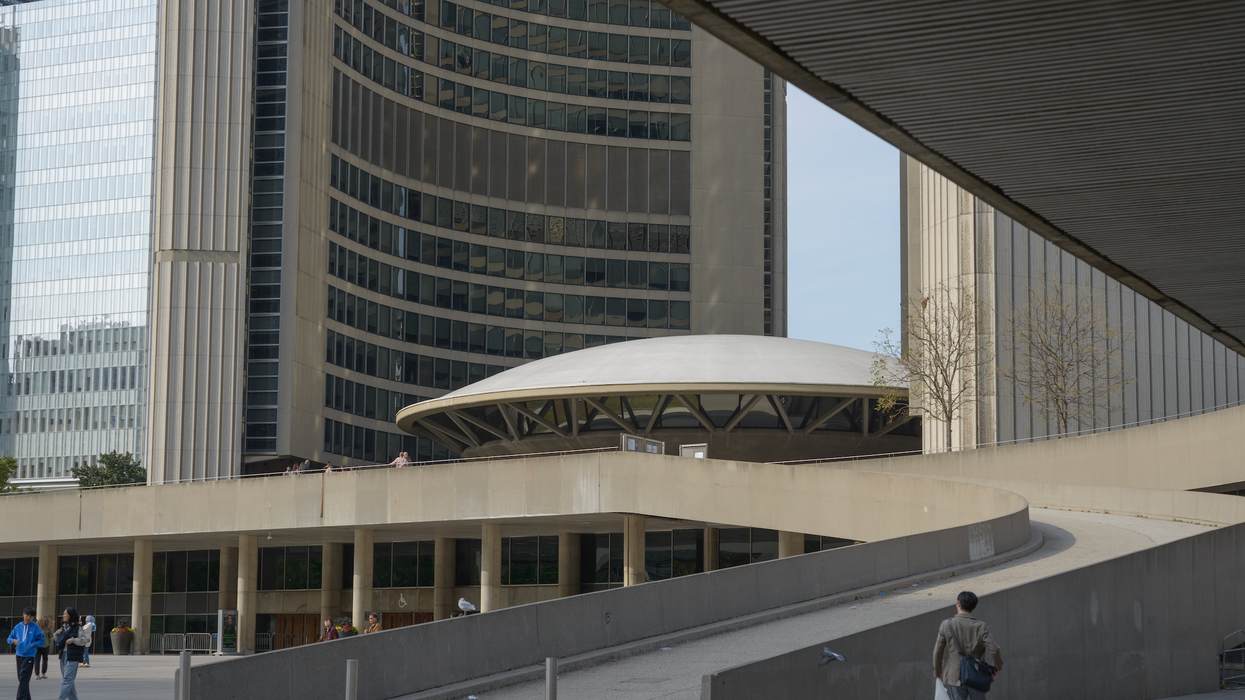At yesterday's session, Toronto City Council adopted a motion from Mayor Olivia Chow to exempt all units in sixplexes from costly development charges and parkland dedications. Chow's recommendation upped the ante on a previously proposed motion from Councillors Jamaal Myers (Ward 23 - Scarborough North) and Josh Matlow (Ward 12 - Toronto-St. Paul's) seeking to eliminate these fees for the first four units in a multiplex.
"I would like to thank Councillors Myers and Matlow for bringing forward this item to make it easier and more affordable to build sixplexes in our City," read a letter from Chow submitted under the item on Tuesday. "[...] As a City, we can do even more to make these projects viable. For that reason, I am recommending we go further and exempt all units in a sixplex from development charges."
Development charges (DCs) are taxes that builders pay to a city in order to help fund increased infrastructure needs that may be required as a result of growth, including services like roads, transit, water, and sewer systems. But over the last 15 years, DCs in the region and across the GTA have skyrocketed, placing additional strain on already struggling development pipelines.
In Toronto, DCs for both one- and two-bedroom non-rental units increased roughly 42% year over year between August 2023 and June 2024. Going back further, DCs on these unit types increased from $4,985 and $8,021 in May 2009 to $52,676 and $80,690, respectively.
When it comes to sixplexes, DCs have presented a unique conundrum for developers. For multiplexes up to four units (fourplexes), DCs have been waived by the City as of 2022, but when a project adds a fifth or sixth unit, the developer is then expected to pay for all six units. This disincentivizes five- and sixplex developments, even on lots where they are viable.
This also dilutes the effectiveness of zoning reforms intended to increase missing middle housing options, such as City Council adopting a motion to permit sixplexes as of right in nine wards last month. The reform, albeit, was a picked-over version of the originally recommended city-wide permittance of sixplexes — one of the 35 milestones committed to under Toronto's December 2023 Housing Accelerator Fund (HAF) agreement with the federal government, for which the City is supposed to receive $118 million in annual funding over four years.
In total, Toronto has agreed to receiving $471 million to put towards achieving its goal of 60,980 net new permitted homes over the next three years, but securing the funds will be dependent on the city's ability to reach its milestones, one of which was approving sixplexes city wide.
At yesterday's council meeting, however, Councillor Stephen Holyday (Ward 2 - Etobicoke Centre) raised concerns over the clarity and interpretation of the language used in the City's HAF agreement with the federal government. Holyday pointed out that the milestone in question only asks for staff to consider a report on permitting sixplexes city wide, while communications from the feds indicate that they expected the City to approve sixplexes city wide.
In a letter dated March 11, 2025, then-Housing Minister Nathaniel Erskine-Smith had stated that if the City failed to permit sixplexes city wide by an extended deadline of June 30, 2025, the feds would withhold 25% (around $30 million) of Toronto's annual funding.
Then, in response to Council voting against city-wide sixplexes last month, the new Minister of Housing, Gregor Robertson, sent a letter to Mayor Chow this Monday expressing his disappointment over Council's vote saying, "the June 25 council vote goes against the level of ambition that was committed to in our Housing Accelerator Fund Agreement by the City of Toronto," and reiterating the risk that the City could miss out on funding.
"I will make no compromises when it comes to the integrity of the [HAF program] or on the level of ambition each agreement requires," wrote Robertson. "[...] Canada is in a housing crisis and we need all levels of government to do everything in their power to respond. A key federal expectation for HAF is to increase as-of-right zoning in low-density urban areas across the country. Our expectation is that larger cities facing greater housing supply challenges would go further, like what we have seen in Vancouver and Edmonton."
Towards the end of the letter, Robertson appears to extend the sixplex deadline to the next annual report of December 20, 2025, at which point, he expects Toronto to "implement an appropriate solution."
During yesterday's question period, prior to the vote on Chow's motion, Councillor Myers asked how the City plans to continue meeting HAF targets without legalizing sixplexes city wide. Deputy City Manager of Development and Growth, Jag Sharma, answered saying that the City is working on a response to Minister Robertson to provide "an update to [the] HAF deliverables that would be acceptable to CMHC and the federal government." But in the case that the feds demand that Toronto legalizes city-wide sixplexes, and Council votes against it once again, there is no current plan for ensuring funding it still received in full.
Today's decision to waive DCs and parklands dedications for sixplexes represents a step in the right direction. The move will make the development of these missing middle-type homes more feasible for builders and, ultimately, more affordable for end users, however, it still falls short of the milestone Toronto had committed to achieving in its HAF agreement signed in December 2023.
“This motion demonstrates real action in tackling Toronto’s housing crisis. By eliminating financial barriers to multiplex construction, City Council is making it easier to add gentle density, expand housing choice, and keep our neighbourhoods vibrant and inclusive," President & CEO of the Building Industry and Land Development Association (BILD), Dave Wilkes, tells STOREYS. "While applauding this change on the DC relief, we encourage the City to expanding the zoning permissions for sixplexes across the city.”





















